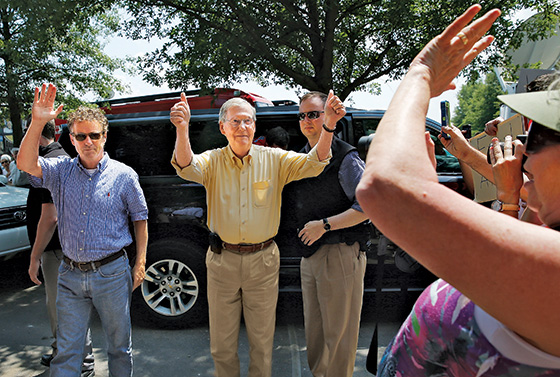 |
Senator Mitch McConnell (center) with Senator Rand Paul on the campaign trail this month.
(Photo: Getty Images) |
Alison was 10 years old at the time of her father’s troubles. “It taught me,” she says, “that politics sometimes doesn’t bring out the best in people.” Grimes is the third daughter of five. Born three months prematurely and weighing less than two pounds, she wasn’t expected to live. “How in the world did she turn out to be the physically strongest of all of us?” says her sister Abby, who is older by 18 months. Intensity runs in the family, but Alison’s focus has always been of a higher order. “I don’t want to say she’s a geek, but … she’s always been focused,” Abby says. “She would go to bed with her school clothes already on.”
Grimes graduated from a small liberal-arts college in Memphis, then went to law school in Washington, at American University. She returned to Kentucky and handled intellectual-property cases at a Lexington firm for a few years and married Andrew Grimes, a marketing executive, in 2006. In 2011, she won the race for secretary of State, renewing intramural Democratic hostilities by beating Governor Beshear’s handpicked candidate in the primary.
Grimes is a good ol’ girl in many respects: a sure shot with a rifle, able to handle her bourbon. “You can’t underestimate how important it is that she looks and sounds Kentucky,” says Bill Hyers, the Democratic strategist who ran Bill de Blasio’s winning mayoral campaign and, before that, Beshear’s reelection effort.
Grimes’s defining trait, says her sister, is that she’s a straight shooter. So I ask Grimes if she’d tell coal miners the harsh truth about their likely futures. This isn’t quite a gotcha question—Kentucky’s coal industry directly employs less than one percent of the state’s workforce, and given Obama’s announcement, in June, of a crackdown on carbon emissions, few believe coal will ever come back. But coal’s hold on Kentucky’s emotions and culture outstrips any statistics. “Look, people in coal country know they’re fucked,” one Kentucky Democrat says. “They know the industry is on the way out, and they know that coal mining kills them. But they don’t have anything else, and what really pisses them off is rich people in L.A. and D.C. telling them to go away.”
Grimes has blasted Obama’s proposals. Today, impressively disciplined, she isn’t about to give her opponent any carbon-based ammunition, especially talking to a reporter visiting from New York. “I will fight tooth and nail to make sure we protect the thousands of jobs that are at stake,” she says. “But it’s not just working to protect their jobs, which differentiates myself from the president, but it’s doing what Mitch McConnell has failed to do, which is the second part in actually diversifying our economy.”
It’s a sane if not profile-in-courage answer, and it might be all Grimes needs—McConnell’s job approval has been hovering around 37 percent, and he’s become a symbol of Washington’s partisan dysfunction. Her policy emphasis is standard-issue centrist Democrat—gender equity in pay rates, protecting benefits for seniors—and her retail campaigning, orchestrated with help from her father, mixes folksy appearances at fairs (and one coal mine) with occasional infusions of star power: Jerry’s pal Bill Clinton has already headlined three Kentucky events for Alison. But as crucial as it is for Grimes and embattled Democrats elsewhere to keep the focus local, they are also getting some invaluable aid from a tough-minded operator in evil old Washington.
The Field General
On Guy Cecil’s computer screen is the draft of a fund-raising email in which autographed copies of Hillary Clinton’s new book is the lure. On the chair across from Cecil’s desk sits his finance director, Angelique Cannon, who is running through the list of events he needs to attend in Arkansas, Colorado, North Carolina, and Georgia. On his mind is a call he needs to make to the White House, to lock in dates for fund-raisers featuring the president.
Cecil—a tall, teenage-skinny 40-year-old with a light southern accent and strawberry-blond hair—is the head of the Democratic Senatorial Campaign Committee. Each campaign is an independent entity, and Cecil isn’t a puppet master; he’s a sounding board and a supplier of strategic infrastructure and advice. But his decisions will shape whether the Democrats retain a majority in the Senate. The first in his family to go to college, Cecil left his job as an ordained Baptist minister at 24 because he didn’t want to lie about being gay. He became a rising star in Democratic circles first as DSCC political director for the 2006 midterms, and then in 2008 by helping craft Hillary Clinton’s late resurgence in the presidential primaries. Installed to lead the DSCC for the 2012 elections, at a time when a Republican takeover of the Senate appeared certain, Cecil instead managed to increase the Dems’ majority by two seats, in part by helping recruit Elizabeth Warren to run in Massachusetts. Cecil would stop by Warren’s Washington condo on weeknights, and the two would drink beer and talk through the options.
 Subscribe
Subscribe


 The Approval Matrix
The Approval Matrix David Edelstein on Are You Here
David Edelstein on Are You Here The Vulture Recommends Generator
The Vulture Recommends Generator 

